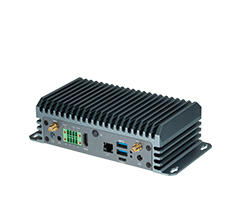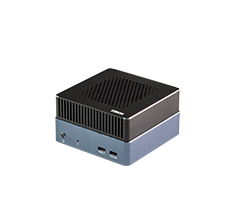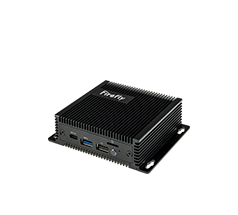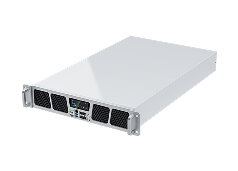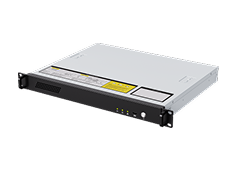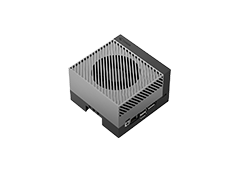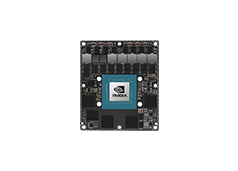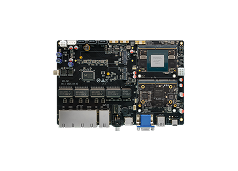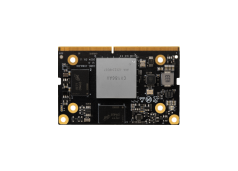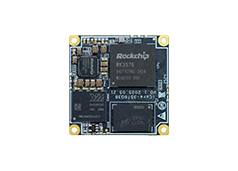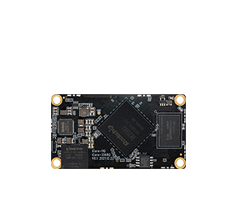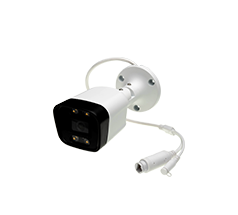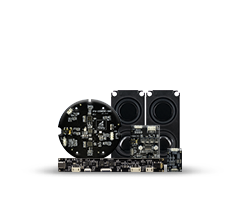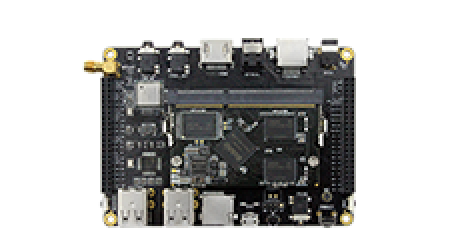SPI
Update time:2018-04-17 Views:3236
SPI is a high-speed, full-duplex, synchronous serial communication interface for connection to a microcontroller, sensors, storage devices, etc. In this paper, let's take the ingerprint recognition module for example to introduce the use of SPI.
SPI working mode
SPI work in master-slave mode, This usually has a master device and one or more slave devices. They need at least four lines, which are:
CS Chip select signals SCLK Clock signal MOSI Master data output, and Slave data input MISO Master data input, and Slave data output
Linux kernel using a combination of CPOL and CPHA to represent the SPI's four working modes:
CPOL=0,CPHA=0 SPI_MODE_0 CPOL=0,CPHA=1 SPI_MODE_1 CPOL=1,CPHA=0 SPI_MODE_2 CPOL=1,CPHA=1 SPI_MODE_3
CPOL:Represents the initial level of the state of the clock signal,0 is low,1 is high.
CPHA:Represents the sampling clock edge, 0 is leading edge, 1 is trailing edge.
SPI waveforms of four working modes as follows: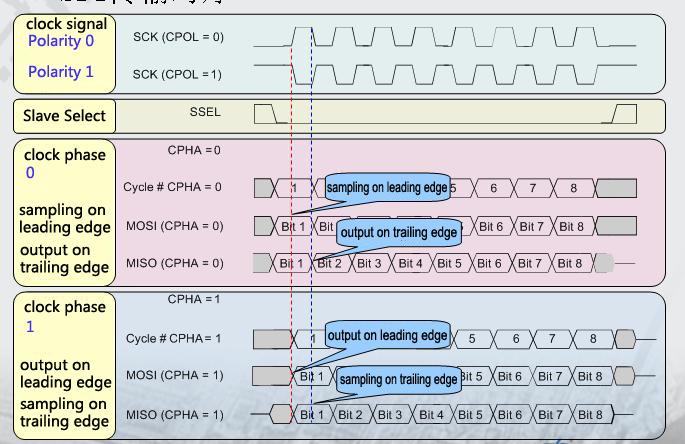
Add your own driver file in kernel
Create a new file in the kernel source directory: kernel/drivers/spi/ for example spi-rockchip-firefly.c
Add the corresponding driver configuration file In the directory where the driver files Kconfig:
@@ -525,6 +525,10 @@ config SPI_ROCKCHIP_TEST bool "ROCKCHIP spi test code" depends on SPI_ROCKCHIP +config SPI_ROCKCHIP_FIREFLY + bool "ROCKCHIP spi firefly code" + depends on SPI_ROCKCHIP + # # There are lots of SPI device types, with sensors and memory # being probably the most widely used ones.
Add the driver file name in the Makefile such as:
+obj-$(CONFIG_SPI_ROCKCHIP_FIREFLY) += spi-rockchip-firefly.o
Select the driver files to add to the kernel options using make menuconfig
There is no help available for this option. │ Symbol: SPI_ROCKCHIP_FIREFLY [=y] │ Type : boolean │ Prompt: ROCKCHIP spi firefly code │ Location: │ -> Device Drivers │ -> SPI support (SPI [=y]) │ -> ROCKCHIP SPI controller core support (SPI_ROCKCHIP_CORE [=y]) │ -> ROCKCHIP SPI interface driver (SPI_ROCKCHIP [=y]) │ Defined at drivers/spi/Kconfig:528 │ Depends on: SPI [=y] && SPI_MASTER [=y] && SPI_ROCKCHIP [=y]
Define and register SPI devices
Add SPI driver node description in DTS, such as: kernel/arch/arm/boot/dts/rk3128-fireprime.dts
&spi0 {
status = "okay";
max-freq = <24000000>;
spidev@00 {
compatible = "rockchip,spi_firefly";
reg = <0x00>;
spi-max-frequency = <14000000>;
spi-cpha = <1>;
//spi-cpol = <1>;
};
};
Status: If you want to enable SPI, then set "okay", if not enabled, set "disable".
spidev@00:Because this example uses the SPI0, and the use of CS0, so here is set to 00, if you use CS1, is set to 01.
Compatible:This property must be consistent with the structure of_device_id members.
Reg: Make this 0x00, consistent with spidev@00.
spi-max-frequency: the highest frequency of SPI.
spi-cpha,spi-cpol: Set the SPI work mode here, The SPI module in this example work in SPI_MODE_1, so we set spi-cpha = <1>. You should mask this two, if your SPI module work in SPI_MODE0. You should set spi-cpha = <1>;spi-cpol = <1>, if your SPI module work in SPI_MODE3.
Define and register SPI driver
Define SPI driver
Before defining the SPI driver, you need to define the of_device_id first.
of_device_id is defined to match the corresponding node in the dts file:
static const struct of_device_id spidev_dt_ids[] = {
{ .compatible = "rockchip,spi_firefly" },
{},
};
Define the spi_driver:
static struct spi_driver spidev_spi_driver = {
.driver = {
.name = "silead_fp",
.owner = THIS_MODULE,
.of_match_table = of_match_ptr(spidev_dt_ids),
},
.probe = spi_gsl_probe,
.remove = spi_gsl_remove,
};
Register SPI driver
Create a character device in initialization function spidev_init(void):
alloc_chrdev_region(&devno, 0,255, "sileadfp");
Add the device to kernel:
spidev_major = MAJOR(devno); cdev_init(&spicdev, &spidev_fops); spicdev.owner = THIS_MODULE; status = cdev_add(&spicdev,MKDEV(spidev_major, 0),N_SPI_MINORS);
Create a device class:
class_create(THIS_MODULE, "spidev");
Register SPI driver to the kernel:
spi_register_driver(&spidev_spi_driver);
If it match Successful when kernel start up, it will call the driver's probe function.Probe function as following:
static int spi_gsl_probe(struct spi_device *spi)
{
struct spidev_data *spidev;
int status;
unsigned long minor;
struct gsl_fp_data *fp_data;
printk("===============spi_gsl_probe ==============\n");
if(!spi)
return -ENOMEM;
/* Allocate driver data */
spidev = kzalloc(sizeof(*spidev), GFP_KERNEL);
if (!spidev)
return -ENOMEM;
/* Initialize the driver data */
spidev->spi = spi;
spin_lock_init(&spidev->spi_lock);//Initialize spin lock
mutex_init(&spidev->buf_lock);//Initialize the mutex
INIT_LIST_HEAD(&spidev->device_entry);//Initialize the device l ist
//init fp_data
fp_data = kzalloc(sizeof(struct gsl_fp_data), GFP_KERNEL);
if(fp_data == NULL){
status = -ENOMEM;
return status;
}
//set fp_data struct value
fp_data->spidev = spidev;
mutex_lock(&device_list_lock);//open the mutex
minor = find_first_zero_bit(minors, N_SPI_MINORS);//Find the first value of 0 in the memory area
if (minor < N_SPI_MINORS) {
struct device *dev;
spidev->devt = MKDEV(spidev_major, minor);
dev = device_create(spidev_class, &spi->dev, spidev->devt, spidev, "silead_fp_dev");//Create device nodes in /dev/
status = IS_ERR(dev) ? PTR_ERR(dev) : 0;
} else {
dev_dbg(&spi->dev, "no minor number available!\n");
status = -ENODEV;
}
if (status == 0) {
set_bit(minor, minors);
list_add(&spidev->device_entry, &device_list);//Added to the device list
}
mutex_unlock(&device_list_lock);//close the mutex
if (status == 0)
spi_set_drvdata(spi, spidev);
else
kfree(spidev);
printk("%s:name=%s,bus_num=%d,cs=%d,mode=%d,speed=%d\n",__func__,spi->modalias, spi->master->bus_num, spi->chip_select, spi->mode,
spi->max_speed_hz);//print SPI message
return status;
}
You can see your driver name in the / dev / directory, and to see your driver device class in sys / class / directory, if you register SPI drive successfully.
SPI read and write data process
SPI write data
static ssize_t spidev_write(struct file *filp, const char __user *buf, size_t count, loff_t *f_pos)
{
struct spidev_data *spidev;
ssize_t status = 0;
unsigned long missing;
if (count > bufsiz)
return -EMSGSIZE;
spidev = filp->private_data;
mutex_lock(&spidev->buf_lock);
missing = copy_from_user(spidev->buffer, buf, count);//copying data from user space to kernel space
if (missing == 0) {
status = spidev_sync_write(spidev, count);//Write synchronization function calls
} else
status = -EFAULT;
mutex_unlock(&spidev->buf_lock);
return status;
}
Write synchronization function:
spidev_sync_write(struct spidev_data *spidev, size_t len)
{
struct spi_transfer t = {
.tx_buf = spidev->buffer,//Send buffer
.len = len,//Send data length
};
struct spi_message m;
spi_message_init(&m);//initialize spi_message
spi_message_add_tail(&t, &m);//add the new spi_transfer to the tail of spi_message
return spidev_sync(spidev, &m);//Synchronous
}
SPI read data
The process of reading data in this example SPI module is:
Host write register address and read the instructions to the module
SPI module send the data to host in the form of page, after it receive the reading instruction
Host Set the read mode
The host reads data and save
static ssize_t
spidev_read(struct file *filp, char __user *buf, size_t count, loff_t *f_pos)
{
struct spidev_data *spidev;
int status = 0;
int i = 0;
spidev = filp->private_data;
mutex_lock(&spidev->buf_lock);
gsl_fp_write(spidev, 0x00, 0xf0);//Host write register address and read the instructions to the module
while(1){
for(i=0;i <= 110*118/128/read_pages;i++){
status = gsl_fp_getOneFrame(spidev,0x00);//read data
}
pos = 0;
break;
}
if(status > 0){
printk("gsl read data success!!!\n");
}else{
printk("gsl read data failed!!!");
}
mutex_unlock(&spidev->buf_lock);
return status;
}
static inline unsigned int
gsl_fp_getOneFrame(struct spidev_data *spidev,unsigned char reg_8b)
{
int status,i;
unsigned char buf_d[128*1+3] = {0x00,0x00};
struct spi_transfer t;
t.tx_buf = buf_d;
t.rx_buf = buf_d;
t.len = 131;
status = gsl_spidev_sync_read(spidev, &t);
if (status > 0){
for(i=0;i<128*read_pages;i++)
kmalloc_area[pos++] = buf_d[i+3];
}
return status;
}
static inline ssize_t
gsl_spidev_sync_read(struct spidev_data *spidev,struct spi_transfer *t)
{
struct spi_message m;
spi_message_init(&m);
t->bits_per_word = 8;//read data length is 8
t->delay_usecs = 1;//Read delay
t->speed_hz = 14*1000*1000;//Read rate
t->cs_change = 1;//CS pin change
spi_message_add_tail(t, &m);
return spidev_sync(spidev, &m);
}
WARNING:Firefly's SPI driver is generic driver under Linux, you can refer to the source kernel/drivers/spi/spidev.c


